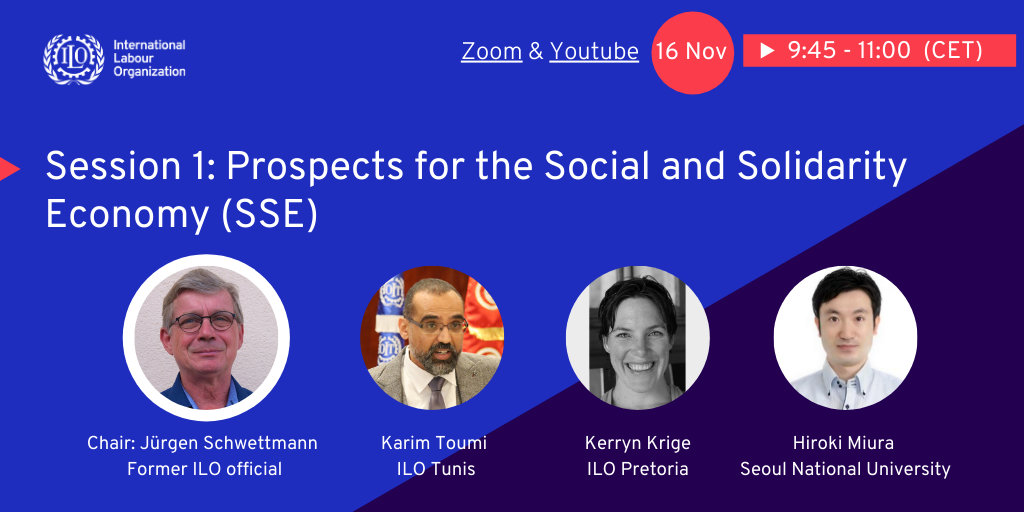ILO COOP/SSE 100 Symposium - Session 1: Prospects for the Social and Solidarity Economy (SSE)

The first session of the two-day symposium focused on prospects for the SSE. The session was chaired by Jürgen Schwettmann, an ILO COOP ex-officio and expert on cooperative and SSE issues. The Chair opened the session by mentioning the growing importance of SSE in different countries and its regulation and promotion through the adoption of laws and public policies. He emphasized the role that SSE is playing in the creation of decent jobs and especially in the transition from informal to formal economy. The three presentations featured during this session reflected on the work of the ILO on SSE in Africa and Asia.
The first presentation was by Mr. Karim Toumi from ILO Tunis who introduced the case of public policies in Tunisia. He presented on the socio-economic elements characterizing the Tunisian context today and how they impact on the world of work. A framework law on SSE was adopted on 17 June 2020 by the Assembly of the Representatives of the People in Tunisia. This law includes the definition of SSE in Tunisia, the recognition of SSE organizations (SSEOs) as tools for job creation and the foundations for the institutional settings to make SSE flourish. Mr. Toumi mentioned that this historic result was possible thanks to a long process of tripartite consultations, based on social dialogue with ILO constituents (government, workers’ and employers’ organizations) and civil society organizations, which were key in the development of this law.
He noted that there were several obstacles encountered during the process, including: the lack of continuity among the different governments; lack of mechanisms in place to support an SSE ecosystem; lack of common vision within the public institutions; no solid decentralization process in place; and lack of reliable data on SSEOs. In addressing some of these challenges ILO continues to work with the Tunisian constituents and partners on different work streams. The creation of a favorable institutional framework is one of the priorities, along with the development of new financing mechanisms for SSE. Other important elements of ILO’s work are on knowledge production, development of education and training curricula and reinforcement of statistical systems on SSE.
The second speaker, Ms. Kerryn Krige, Chief Technical Adviser, ILO, Pretoria introduced the SSE policy development process in South Africa that has been under development since 2017. She introduced some of the lessons learned through the policy development process. More specifically she focused on the findings from the national consultation conducted in 2020 on “What is SSE in South Africa”. She provided some elements of the national context and especially in relation to inequality among different people in accessing the labor market, and social services. The consultation included 760 people in more than 20 cities in nine provinces, selected for having a high index of inequalities.
Ms. Krige noted that one finding concerned the difficulty of defining SSE. The survey showed that 93 per cent of the SSE organizations interviewed were registered, while 84 per cent had a bank account, but 61 per cent did not have a lawyer. Trust was identified as crucial in everyday work and the way of doing business, especially in terms of accountability among the different partners, by 94 per cent of the respondents. This is crucial in understanding SSE in South Africa, as it may call for a shift in the way policy makers conceive policies. Focusing more on enabling trust networks instead of how to regulate SSE entities and systems may be a way to go. Ms. Krige concluded with a consideration between affordability (e.g. social enterprise setting up a business to sell water to cheap prices) and accessibility (e.g. make access to clean water a right for all), showing that “doing good is not enough” and that SSE organizations need to provide sustainable long term solutions.
The third speaker in the session, Dr. Hiroki Miura, Senior Researcher, Center for Social Innovation Research and Education of Seoul National University, Seoul National Center, South Korea introduced the ILO Mapping study on SSE in Asia that was initiated in 2019 with a team of eight researchers six Asian countries as follows: China, Japan and S. Korea, Indonesia, Malaysia and the Philippines. The main purpose of the research was to understand the status of SSE in Asian countries and to suggest intuitional strategies for its strengthening. He mentioned that in Asia most SSE organizations are perceived as hybrid organizations. At the basis of the analytical framework, Dr. Miura mentioned the importance of identifying major legal and political organizations, evaluating, categorizing, mapping, and comparing them.
Dr. Miura mentioned that some of the conclusions include common characteristics of SSE organizations in Asia around: Plurality and Complexity of Hybrid Organizations; Gradual Evolution of the Organizational Landscape; and Internal Limitations to Institutionalization of SSE Organizations. He concluded that the research came up with four policy strategic recommendations around: Mainstreaming; Transformation; Community and Local SSE; and Civil Society and Service Innovation. As a final message Dr. Miura mentioned that empowerment of and solidarity among grassroots practitioners, policy-makers and specialists is needed to effectively tackle the complex challenges facing SSE organizations in Asia.
The question and answer session following the presentations included a discussion around how widely informal SSE practices can be regulated and supported through formal laws, financing of SSE, links between Arab people’s uprisings and the growth of SSE in Tunisia, the next steps in SSE policy development and trust building strategies in South Africa, links between cooperative policies and SSE, municipal SSE promotion initiatives and ensuring decent wages for volunteers and other participants in local SSE initiatives in Asia.
The Chair concluded the session noting the enormous diversity and heterogeneity of SSE around the world as showcased in the presentations during the session.